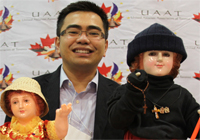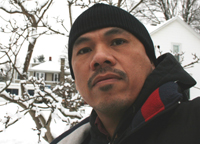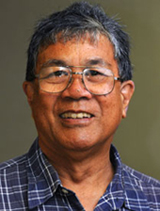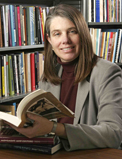
The need for investigating religions beyond their local borders and into the Diaspora has become increasingly critical in the twenty-first century, a period defined by massive migrations of people and their settling into and changing the cultural, social, economic and political landscapes of host localities. Because of the steady and intense fusion of cultures in the Diaspora, religions that immigrants have brought from their home countries inevitably take on different religious and ideological registers. Yet in spite of the apparent urgency in understanding such religious phenomena, much of the scholarship on religious practices has focused on their original site and has simply employed the Diaspora as a point of contrast and comparison.
Through a production of an ethnographic film, Patrick Alcedo’s research creation project, Ati-atihan Festival on the Move: Dancing Culture and Performance of Identity among Filipinos from the central Philippines to Toronto, Canada, differs from others by its zooming the lens of studying a particular religion on the Diaspora and using it as the site of origin rather as an angle for juxtaposition.
The Ati-atihan festival, celebrated by Filipino immigrants in Toronto, specifically the ones from the province of Aklan in the central Philippines, is a textbook case for this particular kind of transnational religious mixture and hybridity. Alcedo’s ethnographic film deepens the studies on Filipinos in Canada that have not concentrated on religion, embodiment, and performance, but predominantly on demographic spread, intergenerational conflicts and differences, and the problem of de-professionalization that most highly educated Filipinos face when they arrive in Canada.
Given that the heart of this research creation project is a festival celebration, articulating it through a visual medium brings to the viewer’s immediate experience Ati-atihan’s movements, sounds, music, color, costumes, choreographic design, and heightened atmosphere—festival elements that a written text is challenged in capturing at once. Alcedo structures the ethnographic film’s narrative using the stories that participants have told and includes footage which the participants themselves have taken. Such structuring enters into an intimate dimension of the lives of participants and their religious and festival experiences, a realm beyond the reach of Alcedo’s direction and videography of his production crew, even though they have established a strong rapport with the participants and are themselves insiders of the Diasporic community they are filming.
A trailer of the documentary can be viewed here: https://vimeo.com/57872664.
This project (2011–2014) is funded by the Social Science and Humanities Research Council through a Research Creation Grant.
Project Team

R. Patrick Alcedo
Born and raised in Aklan, Philippines, R. Patrick Alcedo is associate professor in the Department of Dance at York University in Toronto. While pursuing a Bachelor’s degree in English from the University of the Philippines, Diliman, he performed as a member of the internationally touring Filipiniana Dance Group. He received his PhD in Dance History and Theory from the University of California, Riverside under the auspices of the Asian Cultural Council of New York City. After receiving the PhD, he helped build UC Riverside’s Philippine Studies as a postdoctoral fellow of Southeast Asia Text, Ritual, and Performance programme. In 2007 he was a Rockefeller Humanities Fellow in Theorizing Cultural Heritage at the Smithsonian Institution in Washington, D.C. He is the writer, director, and producer of the multimedia publication Boxing To Be The Next Pacquiao that appeared in the New York Times (2009); the visual essay Ati-atihan: Mother of Philippine Festivals (2010); and the documentary films Panaad: A Promise to the Santo Niño (2011) and Ati-atihan Lives (2011). The anthology Religious Festivals in Contemporary Southeast Asia, of which he is the lead editor, is forthcoming. A former board member of the international Congress on Research and Dance, he chaired the organization’s Awards Committee in 2009-2011. He is the Selma Jeanne Cohen 2014 awardee, given by the Fulbright Association.

Fruto Corre
Fruto Corre is a New York based filmmaker, cameraman and video journalist. He received his Master in Fine Arts degree in Film Production at New York University’s Tisch School of the Arts as a Fulbright Fellow and an Asian Cultural Council scholar. His films were screened in film festivals in Europe, Asia and North America and won awards in the Philippines. His work as a cameraman for “50 Shots”, a news special exploring gun violence and police brutality for Black Entertainment Television (BET), won Second Place for Television Investigative Reporting in the 2008 New York Association of Black Journalists Television Awards. As a documentary filmmaker, he has completed several films, the most recent of which are: At Home At Sea, a film which looks at how members of a Muslim community in the southern Philippines negotiate their cultural identity in an environment constantly threatened with violence, and A Journey with the Ancestors, where he follows the Bajau community’s rites and rituals as it celebrates its ancestors in the southern region of the Philippines. Mr. Corre is the recipient of a Fellowship in Health Reporting by the Henry J. Kaiser Family Foundation. His video report focuses on the HIV/AIDS Prevention initiative for prostituted children and the impact of HIV/AIDS on labor migration and its support to People Living with HIV in Iloilo City, Philippines. His collaboration with Patrick Alcedo has resulted in the New York Times multimedia publication, Boxing To Be The Next Pacquiao (2009), and the ethnographic films: Ati-atihan: Mother Of Philippine Festivals (2010), Panaad: A Promise To The Santo Niño (2011), and Ati-atihan Lives (2011).

Ricardo D. Trimillos
Dr. Trimillos is past Director of the Center for Philippine Studies, Graduate Chair of Asian Studies at the School of Pacific & Asian Studies and Professor in Ethnomusicology at the Music Department at the University of Hawai'i at Manoa in Honolulu, Hawai'i. He was cultural consultant to governments, including the Philippines, the former Soviet Union, Malaysia, and Hong Kong on arts and public policy. His research includes the music of Muslims in the Southern Philippines, Catholic folk music in the Lowland Philippines, and Hawaiian music and dance. He publishes on music and ethnic identity, the arts and cultural rights, and issues of gender in the arts. He is an international resource for world music in education. He has carried out international projects for UNESCO (France, Sweden), the Ford Foundation (Indonesia), the Freeman Foundation (Asia), the Smithsonian Institution and the Rockefeller Foundation (Philippines). His undergraduate degree is from San José State University (California) in music and English literature. The MA in ethnomusicology is from the University of Hawai'i as an EWC grantee and the PhD from UCLA as a John Hay Whitney Fellow. His dissertation featured music among the Muslim Tausug. Other graduate study includes the Ateneo de Manila and the University of Cologne, Germany. He retired from the University of Hawai’i in July 2011.

Sally Ann Ness
Sally Ann Ness is Professor of Anthropology in the Department of Anthropology at the University of California, Riverside. She has worked in cosmopolitan locations in the Philippines as well as in Indonesia and the United States. Her research has focused on various forms of symbolic action, both in the practice of everyday life and in extraordinary ritual and secular performances. She has written on the semiotics of festival life, dance, and sport, as well as on tourism development and its consequences for cultural practice and cultural identity. Her research focuses on choreographic aspects of Visitor practice in Yosemite National Park, drawing in part on the work of Gregory Bateson to illuminate connections between place, embodiment, and motility. She is author of Where Asia Smiles; an Ethnography of Philippine Tourism (2002) and Body, Movement, and Culture; Kinesthetic and Visual Symbolism in a Philippine Community (1992). She is co-editor of Migrations of Gesture (2008 with Carrie Noland) and Religious Festivals in Contemporary Southeast Asia (forthcoming with Patrick Alcedo and Hendrik Maier). Her article publications include: “Bali, the Camera, and Dance; the Lost Legacy of the Mead-Bateson Collaboration,” Journal of Asian Studies (2008); “Tourism/Terrorism; the Landscaping of Consumption and the Darker Side of Place,” American Ethnologist (2005); “Originality in the Postcolony; Choreographing the Neo-ethnic Body in Philippine Concert Dance,” Cultural Anthropology (1997).
